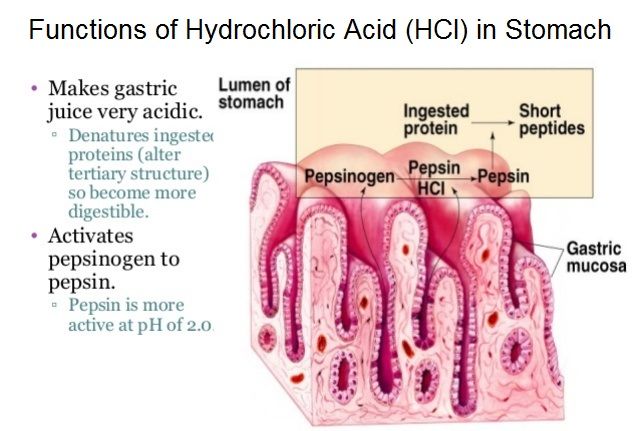Every day the stomach produces about two liters of hydrochloric acid

Every day the stomach produces about two liters of hydrochloric acid.
The human stomach is a fascinating organ that plays a crucial role in the digestion of food. One of its most remarkable functions is the production of hydrochloric acid (HCl), which aids in breaking down the food we consume. In fact, the stomach produces approximately two liters of this powerful acid every day.

Hydrochloric acid is a strong acid composed of hydrogen and chlorine atoms. It is produced by specialized cells in the stomach wall known as parietal cells. These remarkable cells are equipped with an extensive network of tiny channels called canaliculi, which connect them to the stomach’s interior.
The production of hydrochloric acid in the stomach is regulated by various factors, including the presence of food. When we eat, the parietal cells are stimulated to release this acid. This gastric acid secretion process is essential for the proper breakdown of food and the absorption of nutrients.

So, why is hydrochloric acid so vital in the stomach? There are several reasons:
Digestion: Hydrochloric acid plays a fundamental role in breaking down proteins. It denatures proteins, helping to unfold their complex structures and making them more accessible to digestive enzymes like pepsin. This process is crucial for the breakdown of proteins into smaller peptides and amino acids, which can be absorbed by the body.
Antimicrobial properties: Hydrochloric acid creates an acidic environment in the stomach, which is inhospitable to many bacteria and microorganisms. This acidity helps in killing harmful pathogens that might enter our body through the food we consume, preventing potential infections.
Activation of enzymes: Hydrochloric acid activates certain enzymes within the stomach. Specifically, it converts pepsinogen, an inactive enzyme, into its active form called pepsin. Pepsin is responsible for further breaking down proteins, facilitating their digestion.
Maintenance of stomach pH: The stomach has a very low pH due to the presence of hydrochloric acid, typically around 1.5 to 3.5. This acidic environment is necessary for the effective functioning of digestive enzymes and the overall digestion process.
It’s important to note that the production of hydrochloric acid is precisely regulated to avoid any harm to the stomach lining or other organs. The stomach continuously produces a certain amount of mucus that acts as a protective barrier, preventing the acid from damaging the stomach’s inner walls.
In conclusion, the stomach produces approximately two liters of hydrochloric acid every day, contributing to the digestion of proteins, antimicrobial protection, enzyme activation, and maintenance of the stomach’s pH balance. This remarkable acid plays a crucial role in ensuring our bodies can effectively extract nutrients from the food we consume.
Tags
Share
Related Posts
Quick Links
Legal Stuff

